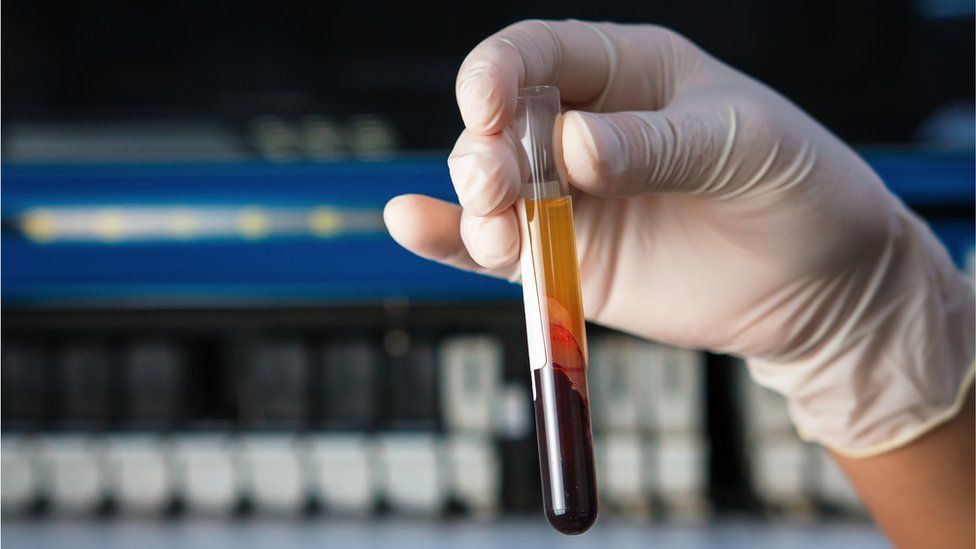Ration blood tests because of test tube shortage, GPs told
- Published

New GP guidance says regular blood tests should be staggered if clinically safe
Family GPs are being told to "ration" non-essential blood analysis due to a test tube shortage.
The vials used to collect samples to be sent to labs for testing are made in the US.
BD, which makes the vials for the NHS across the UK, has warned of serious supply chain issues due to the pandemic and transportation issues.
NHS Wales has issued guidelines which include a temporary pause of a number of blood tests.
The Aneurin Bevan Health Board has written to GPs in its area telling them to halve the number of blood tests they carry out.
"It's not something I've come across before," said one GP, who didn't want to be named.
Their surgery has had to postpone routine blood tests for patients who usually have an annual medication or chronic disease review.
They will continue at the moment for patients who clinically need them.
"Until the bottles run out, we will continue to carry out blood tests for those who clinically need them," the doctor said.
BD said the shortage was being driven by the need for the tubes for testing Covid patients as well as routine testing for procedures that had been delayed due to the pandemic.
It said it was also facing "transportation challenges that have affected all industries, including port and transport capacity, air freight capacity and UK border challenges".
It is manufacturing at optimal levels to improve supply availability and has invested in manufacturing capacity expansion, it added.
Wales' Health Minister Eluned Morgan said the new clinical guidance was to preserve supplies for urgent cases.
"Patient safety remains the priority, and a test would only be delayed if the NHS have assessed it is clinically safe to do so," she said.
"People who require urgent care should continue to seek it as normal."
Health Minister Eluned Morgan said the new clinical guidance was to preserve supplies for urgent cases
The new guidance says GPs can "reduce non-essential testing" including vitamin D testing, and deferring routine infertility testing unless the patient is over 35.
It says allergy testing is "not a priority at this time unless there is clinical need" and routine wellness screening is "not a priority".
NHS England has temporarily stopped some screening for infertility, pre-diabetes and allergies.
The new GP guidance says regular blood tests should be staggered if clinically safe and general practices in Wales have been advised to not stockpile vials.
They have also been told to not carry out blood tests at the surgery if patients are being referred on to hospital for further treatment.
Tests for patients at immediate high risk will be prioritised for the next three months.
This includes patients with conditions where tests might affect how it is treated.
BMA Cymru, which represents doctors, has worked with the Welsh government and NHS Wales Shared Services Partnership on guidance on how to conserve supplies.
It is worried about balancing the effect of the shortage with the patients' needs and that it could lead to a backlog of cases after the pandemic.
BMA Cymru worked with the Welsh government on guidance on how to conserve supplies
BMA Cymru chairman, Dr David Bailey, said "We've got a massive shortage across the UK for the next two or three months.
"We rely on these bottles for almost all of the blood tests that we do for patients, both in general practice and in hospitals, so we're going to have to ration them essentially.
"Patient care will be impacted and while we hope that impact will be minimal, we're coming out of a massive pandemic and have a big backlog of work.
"The very last thing we need is to push more work down the line, because we haven't actually got the tools to do the job."
Diabetes Cymru's Joshua James said blood tests were "essential" in diagnosing type 2 diabetes.
He said: "It is very important that those previously identified by their GP as being at high risk of developing type 2 diabetes receive their annual checks, including checking their blood glucose levels, and do not fall through the cracks due to a logistical issue."
NHS Wales said it and the Welsh government were working closely with other nations to source alternatives to affected products.
MOTHERS, MISSILES AND THE AMERICAN PRESIDENT: The story of Greenham told like never before
CITY OF HORSES: The people and traditions behind Swansea's urban horse community
- Published19 August 2021
- Published30 July 2021
- Published25 August 2021